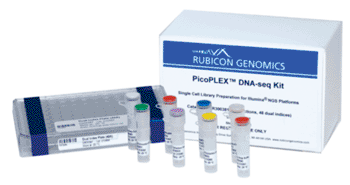Superior Single-Cell Library Preparation Technology Now Available for Additional Platforms
By LabMedica International staff writers
Posted on 17 Feb 2014
Innovative single-cell DNA library preparation kits can now be used with Illumina sequencing platforms.Posted on 17 Feb 2014
Rubicon Genomics (Ann Arbor, MI, USA) now offers its PicoPLEX DNA-seq kits for use with Illumina next-generation sequencing (NGS) platforms. The kits are among Rubicon’s sample-specific library preparation products used in clinical and research testing on NGS, microarray, and quantitative polymerase chain reaction (qPCR) platforms. PicoPLEX’s excellent robustness and reproducibility offer excellent single-cell DNA amplification for microarray and PCR-based preimplantation genetic screening and diagnosis. PicoPLEX DNA-seq now enables clinicians and researchers to access PicoPLEX technology for analyses conducted on Illumina NGS systems.

Image: PicoPLEX DNA-seq kits. Rubicon Genomics’ single-cell library technology now also for Illumina NGS platforms (Photo courtesy of Rubicon Genomics).
PicoPLEX DNA-seq kits amplify DNA to yield a highly reproducible NGS-ready library from a single cell with input concentrations of six picograms or less. PicoPLEX DNA-seq employs the same technology currently used by in vitro fertilization (IVF) clinics to detect chromosomal aneuploidies, copy number variations, and single-gene disorders in reproductive cells. It is also used for the genetic characterization of other single-cell samples such as circulating tumor cells. The easy-to-use, three-step process is performed in a single tube or well in less than 3 hours, thereby reducing error and contamination, speeding time to results, and reducing costs.
James Koziarz, PhD, CEO of Rubicon Genomics, commented, “PicoPLEX DNA-seq emphasizes our commitment to increasing the robustness and reproducibility of DNA analyses while also delivering greater speed, efficiency and cost savings. This launch represents another milestone in our ongoing strategy to make Rubicon Genomics’ proprietary library preparation technology available to users of all sequencing platforms.”
Dr. Brian Mariani, chief scientist and scientific director of the Genetics and IVF Institute, helped test the PicoPLEX DNA-seq kits. He commented, “Remarkably, the sequencing data from the PicoPLEX DNA-seq libraries of embryo DNA clearly identified a male balanced translocation that had not been detected by previous microarray and FISH [fluorescence in-situ hybridization] analyses. This is a significant example of how PicoPLEX sequencing data can expose important structural rearrangements missed by other approaches.”
At the 15th annual Advances in Genome Biology and Technology meeting (AGBT 2014; February 12–15, 2014, Marco Island, FL, USA), Rubicon CSO Dr. John Langmore presented studies highlighting PicoPLEX DNA-seq and discussed “Preimplantation genetic screening and diagnostics (PGS/PGD) at low NGS coverage for aneuploidy, CNV, and single-gene disorder detection for in vitro fertilization.”
Related Links:
Rubicon Genomics
PicoPLEX DNA-seq
Advances in Genome Biology and Technology Meeting













